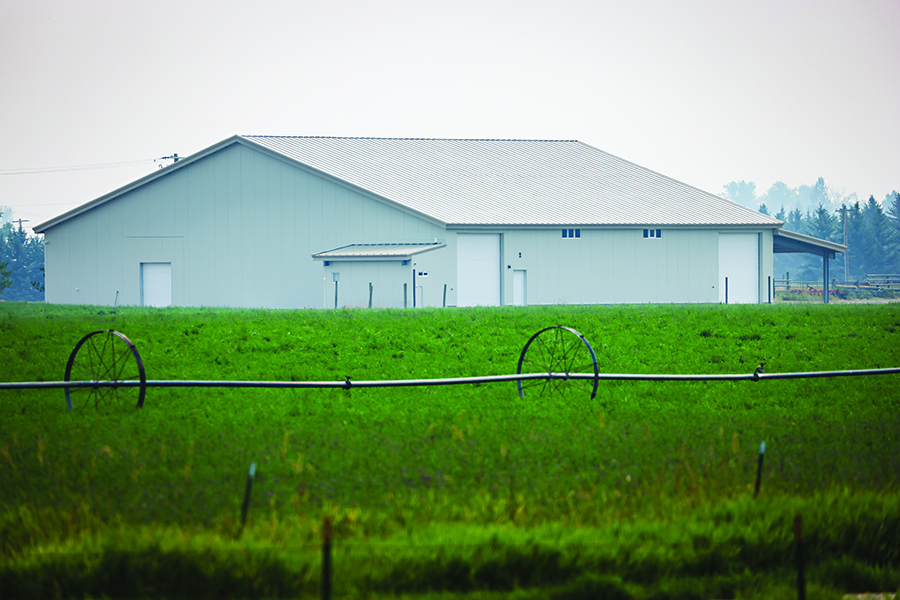Judge Voids Flathead Valley Bottling Plant’s Water Permit
New ruling says Montana erred by allowing Creston water bottling facility to produce a billion bottles of water per year
By Tristan Scott
A Montana district judge has again overturned a state agency’s permit for a Creston water-bottling plant to produce up to a billion bottles of water a year along the banks of the Flathead River, writing in a Sept. 30 order that the Montana Department of Natural Resources and Conservation (DNRC) erred when it granted the bitterly contested water right a half-decade ago.
It’s the latest turn in a tortuous administrative legal odyssey that began in 2015, when Montana Artesian Water Co. (MAWC) and its founder, Creston landowner Lew Weaver, asked for and received a permit from the DNRC allowing the company to produce up to 140,000 water bottles per hour, 24 hours a day, seven days a week. In technical terms, the water right authorized Weaver’s company to receive 710 acre feet of water annually, equaling roughly 1.2 billion 20-ounce water bottles.
The bottling operation drummed up considerable attention, fueling concerns among neighbors and residents across the valley and leading to the formation of Water for Flathead’s Future, a group organized to fight the bottling plant while raising objections on multiple legal fronts, including filing two complaints in an effort to prevent the facility from beginning production.
Those objections are at the center of a 27-page order by Lewis and Clark County District Judge Kathy Seeley, which hands a major victory to two nonprofit groups, Water for Flathead’s Future and the Flathead Lakers, as well as 10 neighboring landowners to MAWC. The order signals the second time Judge Seeley has invalidated DNRC’s permit, with the Montana Supreme Court reversing her original order and remanding it for further action.
Unlike her first order, however, which touched on just one of the six legal objections raised by the groups and their attorneys, Seeley’s most recent order delves into numerous objections, broadening the scope of the ruling and, the groups’ attorneys hope, strengthening their chances on appeal.
“This is a more secure decision than the last time we won, and we believe it is more defensible on appeal if the company decides to appeal again,” said Graham Coppes, an attorney with the Ferguson Law Office in Missoula, who is representing the nonprofit groups. Coppes added that a Flathead County judge recently ruled against MAWC in a separate lawsuit, dealing a one-two legal punch to the viability of MAWC’s business enterprise.
In the related case, District Judge Amy Eddy ruled in August that DNRC and the Montana Department of Environmental Quality (DEQ) improperly assessed the environmental impacts of the proposed water-bottling plant before granting permits for the project.
“I don’t know what the company’s level of resolve is coming on the heels of two very substantial losses in a period of 60 days,” Coppes said. “We hope that eventually this guy’s well runs dry, so to speak.”
Darryl James, a spokesperson for MAWC, said Weaver’s legal team has been in touch with DNRC about Judge Seeley’s order but is still reviewing the “full breadth” of the legal decision and has not yet made a decision about whether to appeal.
A spokesperson for the DNRC wrote in an email that the agency has not yet made a determination in how to proceed in the case.
“We are still evaluating Judge Seeley’s decision and have no comment at this time,” the spokesperson wrote.
In reversing the DNRC’s decision, Seeley pointed to numerous instances in which MAWC did not provide the information required by DNRC’s administrative rules for a scientifically valid analysis that is at the heart of the water permitting process. The judge pointed out that, in doing so, DNRC “missed a critical foundational step in determining whether a permit should be granted.”
As one example, Seeley wrote that DNRC’s reliance on a 2011 agency memorandum to evaluate whether the amount of water requested by MAWC is “legally available” was inappropriate and circumvented the requirements of its own administrative rules. The memo provided the thrust of the agency’s justification for narrowly confining the focus of its “legal availability” analysis to Flathead River and Flathead Lake, thus disregarding the numerous springs, sloughs, and wells that could be affected by year-round pumping operations.
Steve Moore, chair of Water for Flathead’s Future and one of the petitioners, said he is pleased that Judge Seeley’s ruling effectively stays the DNRC’s permit, meaning MAWC’s bottling operation cannot continue during the pendency of the appeal.
“Water for Flathead’s Future would like to thank the entire Flathead Valley community that has held steadfast throughout the years,” Moore wrote in a prepared statement. “There has been a lot of emotion on this issue but in the end all we ask is that the DNRC follow the law and perform its duties responsibly and reliably. We are grateful for the time and hard work that the court put into this well-reasoned ruling.”